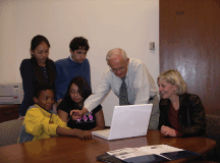WISE – Web-based Inquiry Science Environment
Impact
Studies show that the WISE curriculum helps students learn challenging science topics, and that students strengthen their grasp of these topics even after they have completed the curriculum. Leaders of WISE believe they can nearly double the number of students worldwide who use WISE materials in the next three years–to almost 140,000 students.
Accomplished
- Need Accomplished
- Evaluation Developing
- Sustainability Accomplished
- Replication & Scalability Accomplished
- Partnerships Accomplished
- Capacity Accomplished
- Challenging & Relevant Content Accomplished
- STEM Practices Accomplished
- Inspiration Developing
- Under-Represented Groups Developing

Design Principles
The programs in this database clear a high bar. STEMworks reviewed each program against the Design Principles for Effective STEM Philanthropy. Programs must be Accomplished () across all Design Principles, or be Developing (
) in a maximum of three areas.
Overarching Principles
-
Need Accomplished
Identify and target a compelling and well-defined need.
-
Evaluation Developing
Use rigorous evaluation to continuously measure and inform progress towards the compelling need identified.
-
Sustainability Accomplished
Ensure work is sustainable.
-
Replication & Scalability Accomplished
Demonstrate replicability and scalability.
-
Partnerships Accomplished
Create high impact partnerships.
-
Capacity Accomplished
Ensure organizational capacity to achieve goals.
STEM Principles
-
Challenging & Relevant Content Accomplished
Offer challenging and relevant STEM content for the target audience.
-
STEM Practices Accomplished
Incorporate and encourage STEM practices.
-
Inspiration Developing
Inspire interest and engagement in STEM.
-
Under-Represented Groups Developing
Identify and address the needs of under-represented groups.
Program Overview
WISE is an open-source online platform for designing, developing, and implementing science inquiry activities. WISE provides one-week-long inquiry units that address key concepts consistent with California and national standards. WISE units can be integrated into a school’s existing science curriculum or specifically customized for classroom use. WISE provides a simple user interface, cognitive hints, embedded reflection notes and assessments, and online discussions, as well as software tools for activities such as drawing, concept mapping, diagramming, and graphing. WISE can also incorporate interactive simulations and models built in a variety of modern web technologies. WISE projects aim to promote student self-monitoring through collaborative reflection activities and teacher feedback. WISE provides teachers with a suite of integrated tools for managing and promoting student learning. Teachers are able to monitor students’ real-time progress, provide immediate feedback on student work, and grade their work using automated scoring systems. WISE aims to effectively facilitate classroom management tasks, freeing teachers to focus on diverse students’ learning needs by interacting with individual students and gaining insights about classroom learning as a whole.
Funders and Partners
National Science Foundation, Concord Consortium, Educational Testing Service, University of Toronto, University of Virginia, Vanderbilt University, University of Minnesota, Michigan State University, National Kaohsiung Normal University